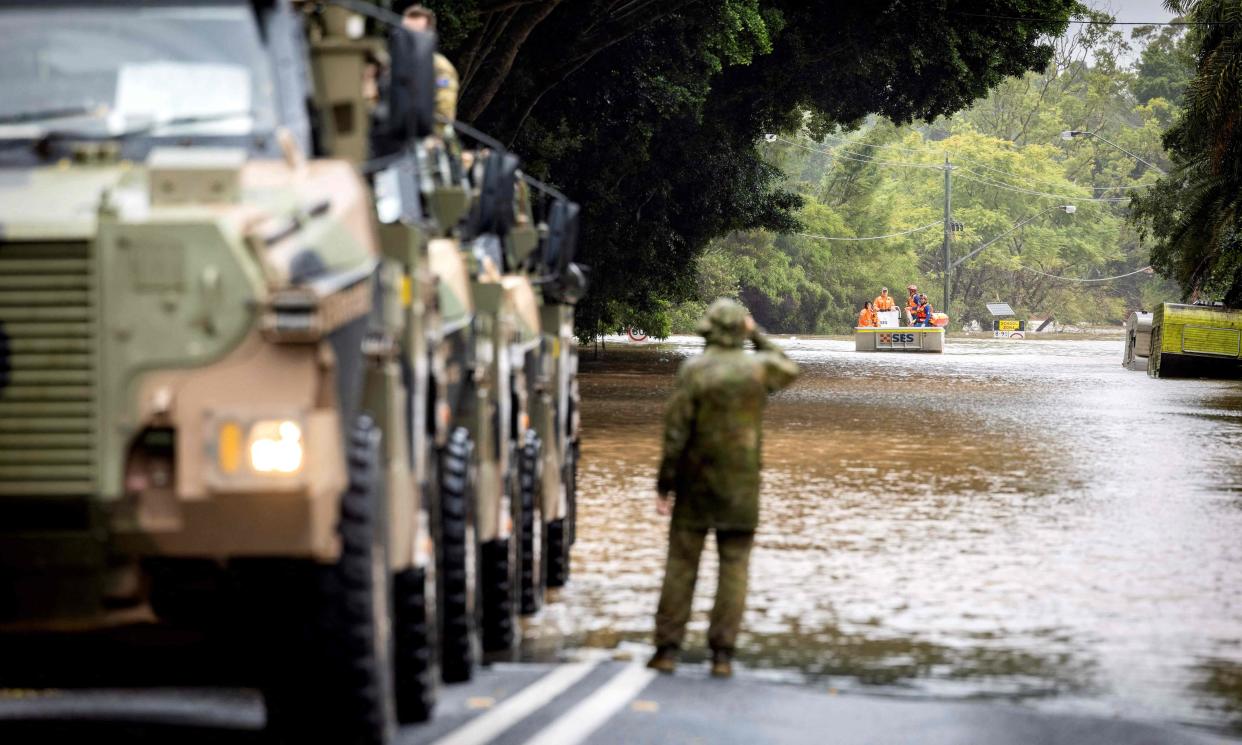Former ADF chief calls for release of secret report into security threat posed by climate crisis

A former Australian defence force chief has called on the government to release its assessment of the security threats posed by the climate crisis, which he says they received late last year.
Guardian Australia understands the Office of National Intelligence’s “urgent climate risk assessment” looked at how global heating affected Australia’s national security, but relied in part on classified information.
This means the government would have to decide whether, and how, the assessment is released publicly.
Related: Anthony Albanese to order intelligence chief to examine security threats posed by climate crisis
The former ADF chief Chris Barrie said he was concerned climate security risks were “missing in action” in the public debate triggered by the Aukus nuclear-powered submarine announcement.
Barrie said it was “rather surprising” that the Albanese government was continuing the previous Morrison government’s framing of China as the predominate security threat to Australia.
“Climate change as a security threat seems to be totally overlooked,” he said.
Sign up for Guardian Australia’s free morning and afternoon email newsletters for your daily news roundup
Barrie, an executive member of the Australian Security Leaders Climate Group, said he had been told the ONI-led assessment of external climate risks was completed in November or December. Ordering such an assessment had been a Labor election promise.
Barrie urged the government to take the community into its confidence by releasing a declassified report on the findings. He said Australians should be armed with this information so they could “come on board and help deal with the problem”.
“As time goes on, and it does less to bring people into the confidence of government on this, I think it will erode some of the trust the Albanese government has enjoyed in its early days,” Barrie said.
He said the community expected the ADF would be there to help when disasters hit, but “there aren’t a lot of available people in a defence organisation like ours”.
Australia may also be asked to respond to crises in Pacific island countries and south-east Asia.
“If you could imagine concurrent events, like the black summer of bushfires and a call from another country in our region for help, we’re going to be really stretched in setting priorities and managing those pressures because we simply don’t have enough resources,” Barrie said.
The climate risk assessment is separate from the defence strategic review, which was led by the former defence chief Angus Houston and former defence minister Stephen Smith.
The defence strategic review focused on the ADF’s posture, structure and capabilities and was handed to the government in February. The government plans to release a declassified version of that work in the coming weeks as the budget approaches.
Related: Australia needs ‘wartime mobilisation’ response to climate crisis, security leaders say
But the deputy prime minister, Richard Marles, has moved to assure the community that the defence strategic review is “mindful of the security challenges associated with climate change”.
In an interview with Guardian Australia in January, Marles acknowledged climate change would affect the shape of the defence force.
“That goes from security issues around scarcity of resources, which give rise to greater tension, but it’s also humanitarian and disaster response – the defence force is inevitably a part of providing that response. We’re seeing more climate-based disasters, both both in Australia and in our region,” Marles said.
A Defence spokesperson said on Tuesday: “As the defence strategic review is with the government for consideration, it would be inappropriate to pre-empt its recommendations or outcomes.”
The prime minister’s office was also contacted for comment.

 Yahoo News
Yahoo News 
